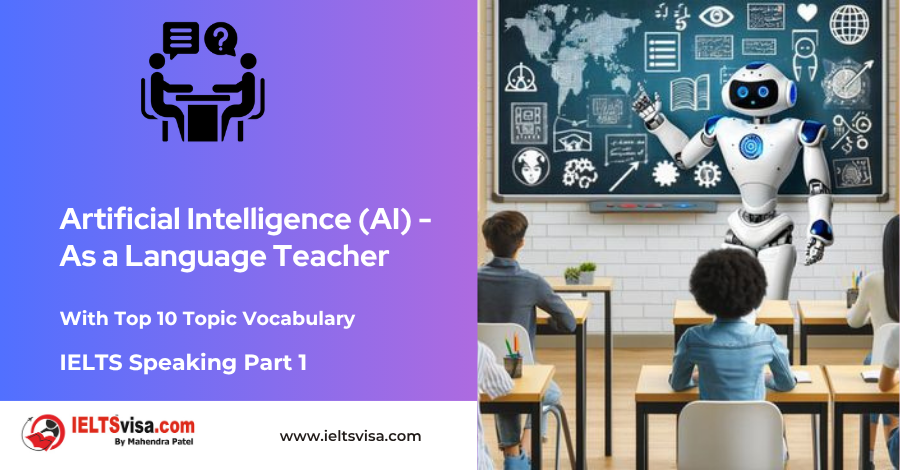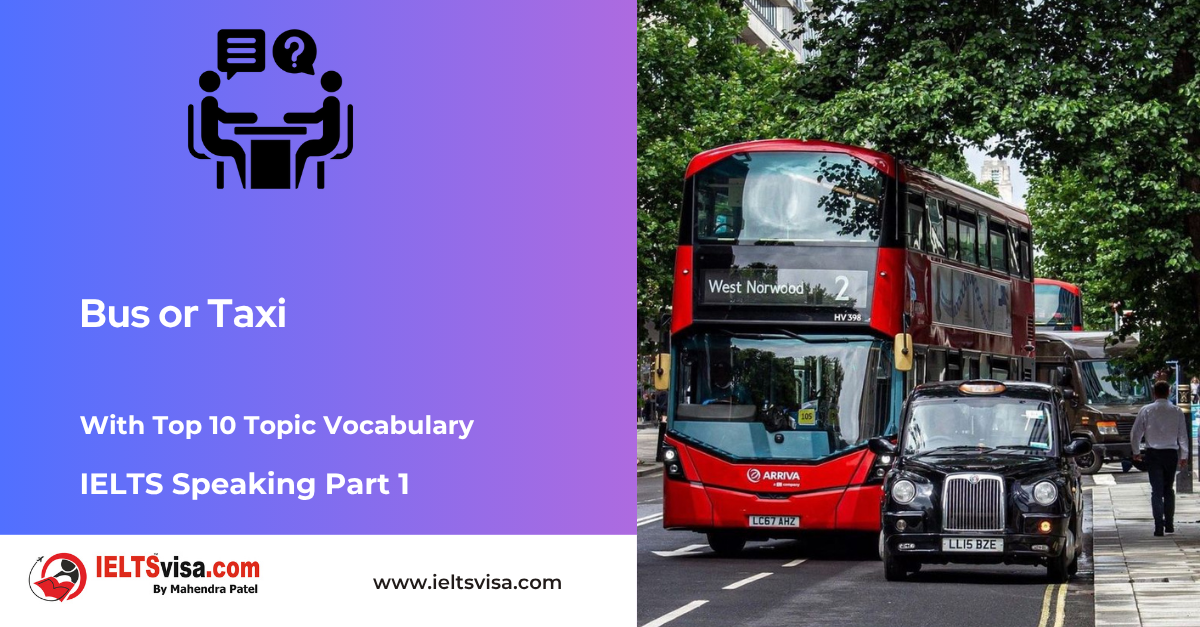IELTS Speaking Part 1 – Artificial Intelligence (AI) As a Graphic Designer
IELTS Speaking Practice
IELTS Speaking Part 1 -Artificial Intelligence (AI) As a Language Teacher
Examiner: How do you think AI is impacting language teaching?
Candidate: AI significantly impacts language teaching by providing personalized learning experiences, offering instant feedback, and creating interactive and engaging educational tools.
Examiner: Do you use AI tools in your language classes?
Candidate: I use AI-powered tools such as language learning apps, virtual assistants, and grammar correction software to enhance the learning experience for my students.
Examiner: What are the benefits of using AI in language learning?
Candidate: AI offers benefits like personalized learning paths, immediate error correction, and the ability to practice speaking with AI-driven chatbots, which helps students improve their language skills more efficiently.
Examiner: Can you give an example of an AI tool that helps with language teaching?
Candidate: One useful AI tool is Duolingo, which adapts to each learner’s progress and provides personalized exercises to improve their language skills.
Examiner: How does AI provide personalized learning experiences in language education?
Candidate: AI analyzes each student’s strengths and weaknesses and tailors lessons and exercises to address their specific needs, ensuring a more effective learning process.
Examiner: Do you think AI can replace language teachers in the future?
Candidate: While AI can automate certain aspects of language learning, it cannot replace the human interaction, cultural insights, and personalized feedback that language teachers provide. AI should be seen as a complementary tool rather than a replacement.
Examiner: How do you stay updated with AI advancements in language teaching?
Candidate: I stay updated by attending educational technology conferences, participating in webinars, and reading research articles on the latest AI developments in language education.
Examiner: What challenges do you face when integrating AI into language teaching?
Candidate: Challenges include ensuring the AI tools are culturally appropriate, maintaining student engagement, and addressing the varying levels of access to technology among students.
Examiner: How do you ensure that AI tools are effective in language teaching?
Candidate: I ensure effectiveness by regularly assessing the tools, gathering student feedback, and integrating AI with traditional teaching methods to create a balanced approach.
Examiner: Can AI help improve students’ pronunciation and speaking skills?
Candidate: Absolutely! AI can provide instant feedback on pronunciation, offer practice conversations with virtual assistants, and use speech recognition technology to help students improve their speaking skills.
Examiner: Do students typically enjoy using AI tools in language learning?
Candidate: Most students enjoy using AI tools because they are interactive, engaging, and provide a different learning experience compared to traditional methods. However, it varies based on individual preferences.
Examiner: How do you handle data privacy concerns with AI in language teaching?
Candidate: I handle data privacy by using AI tools that comply with data protection regulations, informing students about data usage, and ensuring that any personal data collected is securely stored and used responsibly.
Examiner: What AI advancements are you most excited about for the future of language teaching?
Candidate: I am excited about advancements in natural language processing, which can improve the accuracy of AI language tutors, and immersive AI technologies like virtual reality that can create realistic language learning environments.
Examiner: How does AI assist in assessing students’ language proficiency?
Candidate: AI can assist by automatically grading writing assignments, providing instant feedback on quizzes, and analyzing spoken language for pronunciation and fluency, making the assessment process more efficient and objective.
Examiner: What advice would you give to a language teacher who is new to using AI in the classroom?
Candidate: Start by experimenting with a few AI tools, integrate them gradually into your lessons, and seek feedback from your students. Stay open to learning and adapting, and remember that AI is a tool to enhance your teaching, not replace it.
Top 10 Topic Vocabulary for “Artificial Intelligence (AI) As a Language Teacher”
|
Vocabulary |
Type |
Meaning |
Synonyms |
Antonyms |
Word Family |
Example Sentences |
|
Personalized |
Adjective |
Tailored to a specific individual or group |
customized, individualized, bespoke |
standardized, generic, common |
personalization |
AI can provide personalized learning experiences. |
|
Interactive |
Adjective |
Involving or requiring the active participation of two or more people |
participatory, engaging, involving |
passive, non-interactive, inactive |
interaction |
AI-powered tools can create interactive language learning experiences. |
|
Efficiency |
Noun |
The ability to accomplish a task with the least amount of effort |
effectiveness, productivity, effectiveness |
inefficiency, ineffectiveness, unproductivity |
efficient |
AI can improve the efficiency of language learning. |
|
Personalized learning paths |
Noun |
Learning paths that are tailored to individual students’ needs and abilities |
individualized learning, differentiated instruction, adaptive learning |
personalized |
AI can create personalized learning paths for language learners. |
|
|
Cultural insights |
Noun |
Understanding and appreciation of different cultures |
cultural awareness, cultural knowledge, cross-cultural understanding |
cultural |
Language teachers provide cultural insights to their students. |
|
|
Data privacy |
Noun |
The protection of personal information |
privacy protection, data protection, information privacy |
privacy |
Language teachers must address data privacy concerns when using AI tools. |
|
|
Immersive |
Adjective |
Completely absorbing or engaging |
engrossing, absorbing, riveting |
immersion |
Immersive AI technologies can create realistic language learning environments. |
|
|
Objective |
Adjective |
Not influenced by personal feelings or opinions |
impartial, unbiased, neutral |
subjective, biased, prejudiced |
objectivity |
AI can provide objective assessments of students’ language proficiency. |
|
Supplement |
Verb |
Add to something in a way that enhances or improves it |
enhance, reinforce, complement |
detract from, diminish, reduce |
supplementary |
AI should be used as a supplement to traditional language teaching methods. |
|
Integrate |
Verb |
Combine or merge into a single whole |
incorporate, unite, unify |
separate, divide, segregate |
integration |
Language teachers should integrate AI tools into their lessons. |

Our Books
Master IELTS Speaking Part 1
IELTS Writing Task 1 Book
IELTS Writing Task 2 Book
Practice IELTS Other Modules
IELTS Listening
The IELTS Listening test assesses how well you can understand spoken English in various contexts. It lasts about 30 minutes and is divided into four sections with a total of 40 questions. The listening tasks become increasingly difficult as the test progresses.
IELTS Academic Reading
The IELTS Academic Reading section assesses your ability to understand and interpret a variety of texts in academic settings. It is designed to evaluate a range of reading skills, including skimming for gist, reading for main ideas, reading for detail, understanding inferences, and recognizing a writer's opinions and arguments.
IELTS Speaking
The IELTS Speaking test assesses your ability to communicate in English on everyday topics. It lasts 11-14 minutes and consists of three parts: introduction, cue card, and a discussion based on the cue card topic.
IELTS General Reading
IELTS General Reading tests your ability to understand and interpret various types of texts. Here are some key areas and types of content you can expect to encounter in the reading section, along with tips for effective preparation.
IELTS Academic Writing Task 1
In IELTS Academic Writing Task 1, you are presented with a visual representation of information, such as graphs, charts, tables, or diagrams, and you are required to summarize, compare, or explain the data in your own words.
IELTS General Writing Task 1
In IELTS General Writing Task 1, you are required to write a letter based on a given situation. The letter can be formal, semi-formal, or informal, depending on the prompt. Here’s a breakdown of the key components to include in your letter
IELTS Academic Writing Task 2
In IELTS Academic Writing Task 2, you are required to write an essay in response to a question or topic. Here’s a guide to help you understand the essential elements of this task
IELTS Exam Tips
To succeed in the IELTS exam, practice regularly, familiarize yourself with the test format, improve your vocabulary, develop time management skills, and take mock tests to build confidence.
Grammer for IELTS
Grammar is the foundation of effective communication in English. Understanding tense usage, subject-verb agreement, and sentence structure enhances clarity and coherence in writing and speaking.
Vocabulary for IELTS
Vocabulary plays a crucial role in the IELTS (International English Language Testing System) exam, especially in the Speaking and Writing sections. Here’s an overview of why vocabulary is important and how it impacts your performance
RECENT IELTS SAMPLES QUESTIONS AND ANSWERS
IELTS Speaking Part 1 – Boats
IELTS Speaking Part 1 - Boats Examiner: Have you ever been on a boat?Candidate: Yes, I have been on a boat a...
IELTS Speaking Part 1 – Books
IELTS Speaking Part 1 - Books Examiner: Do you like reading books?Candidate: Yes, I enjoy reading books very...
IELTS Speaking Part 1 – Bus or Taxi
IELTS Speaking Part 1 - Bus or Taxi Examiner: How do you usually get around town?Candidate: My preferred mode...
IELTS Speaking Part 1 – Celebrity (Indian)
IELTS Speaking Part 1 - Celebrity (Indian) Examiner: Do you have a favourite celebrity?Candidate: My favourite...
IELTS Speaking Part 1 – Celebrity – Sports (Indian) – Virath Kohali
IELTS Speaking Part 1 - IELTS speaking part 1 - Celebrity - Sports (Indian) - Virath Kohali Examiner: Who is...
IELTS Speaking Part 1 – Artificial Intelligence (AI) as a Singer
IELTS Speaking Part 1 - Artificial Intelligence (AI) - As a Singer Examiner: How do you see AI impacting the...













